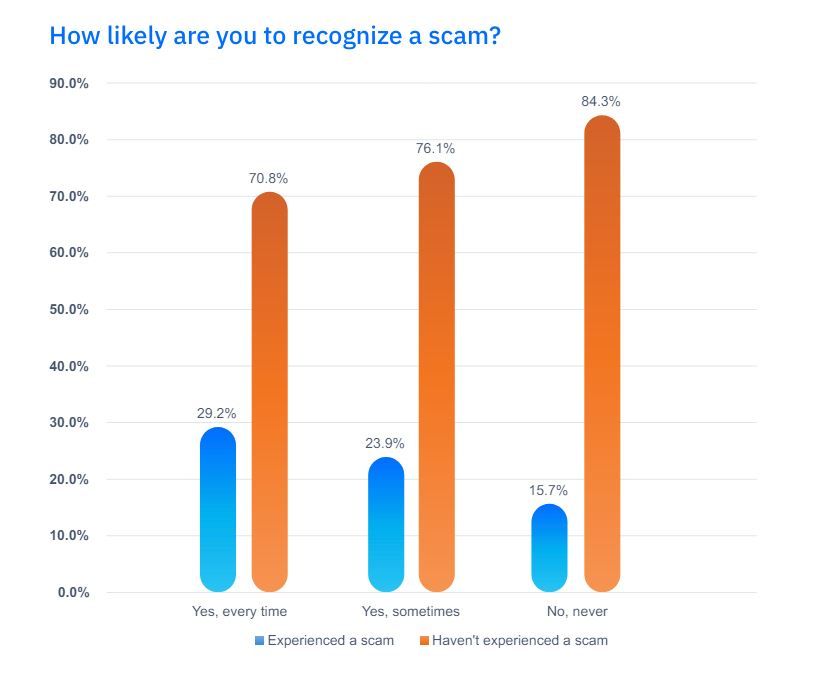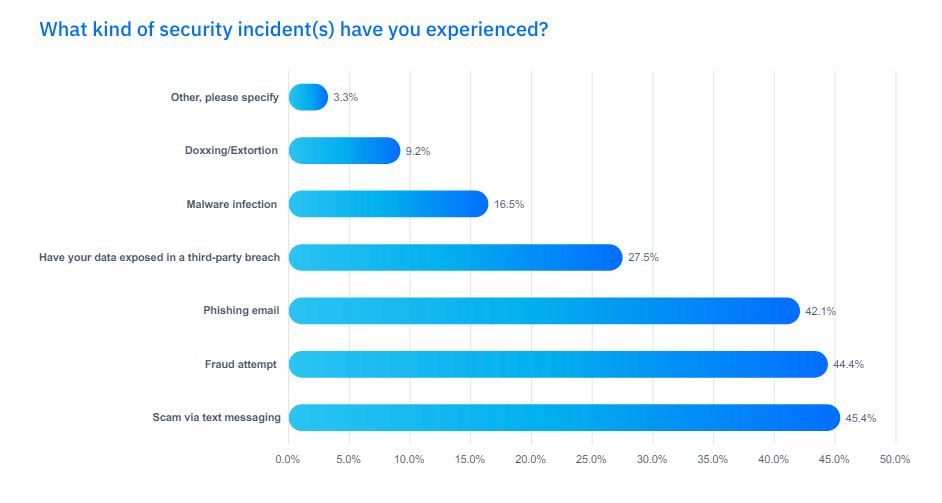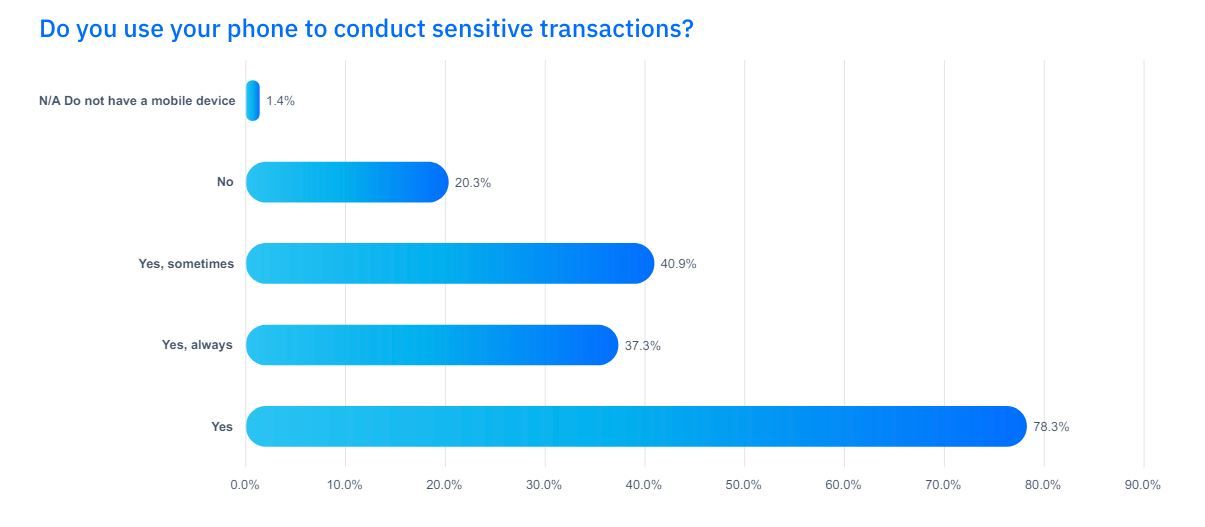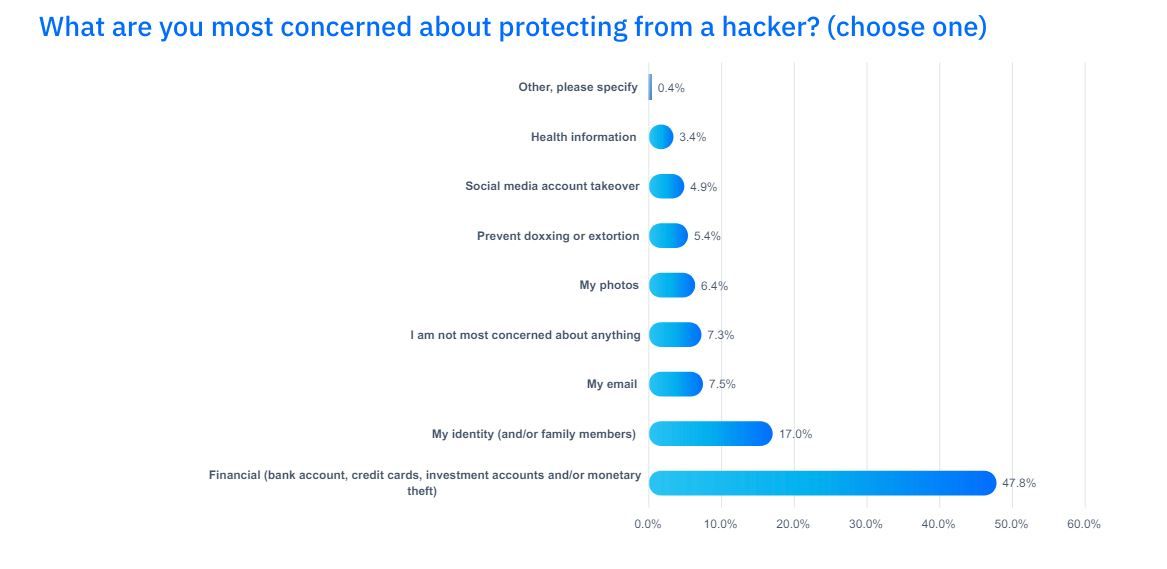SMS Scams Run Rampant yet Consumers Still Rely on Phones for Sensitive Transactions

According to the results in the Bitdefender 2024 Consumer Cybersecurity Assessment Report, SMS scams are the most common threat consumers face today. Yet four in five make sensitive transactions on their phones, while at the same time failing to exercise adequate cybersecurity practices -- all while saying their biggest concern is hackers accessing their finances.
During our survey, we asked respondents how able they considered themselves to recognize a scam. According to the results, people who say they can recognize a scam are more likely to have suffered one (29%), versus those who don’t always (24%), or never (16%) recognize scams. This indicates that people who can’t recognize a scam may have experienced one without knowing.

Credit: Bitdefender (Bitdefender 2024 Consumer Cybersecurity Assessment Report)
We then asked respondents who experienced a security incident in the past year to identify exactly what type of threat they faced, and choose all that applied to them.

Credit: Bitdefender (Bitdefender 2024 Consumer Cybersecurity Assessment Report)
As shown in the chart above, text-messaging scams placed first, followed by fraud, phishing, data exposure, malware, and doxing/extortion.
The results weren’t shocking, considering the abundance of SMS-borne scams in recent years. But this hasn’t stopped consumers from using their phones to do banking, access healthcare data, manage investments, trade crypto, etc.

Credit: Bitdefender (Bitdefender 2024 Consumer Cybersecurity Assessment Report)
Almost four in five said they use their mobile device for sensitive transactions, with 37.3% stating they “always” do so and 41% saying “sometimes.” Only 20.3% said they didn’t use a mobile device to manage sensitive data or conduct transactions.
The findings clash with the results from another question: “What are you most concerned about protecting from a hacker?”

Credit: Bitdefender (Bitdefender 2024 Consumer Cybersecurity Assessment Report)
As we note in the report, our behavior regarding cybersecurity doesn’t always match our stated fears and concerns. Bad actors increasingly exploit complacency around cybersecurity, threatening our security and privacy online.
Text scams are a multi-faceted threat, enabling phishing campaigns, fraud, government impersonation scams, and even malware delivery. Americans lost over a billion dollars to scammers impersonating businesses or government agencies in 2023, the FTC said in a report this year.
SMS is an even bigger problem in the context of multi-factor authentication (MFA). SIM jacking (aka SIM swapping) enables bad actors to intercept your one-time authentication codes and take over your accounts. In other words, you don’t want SMS-based MFA to your crypto wallet or bank account. That’s why we always recommend shifting to a trusted authenticator app instead.
Bitdefender recently introduced Scamio, a free scam detector and prevention service for anyone with a Bitdefender account.
Suspicious about a certain phone call, phishing email, SMS or strange ad? Simply describe the situation to our clever chatbot and let it guide you to safety. You can also share with Scamio the exact thing you want to check, such as a screenshot, PDF, QR code, or link. Scamio lets you know in seconds if it’s a sham. For peace of mind, consider using a dedicated security solution on your phone.
To learn more about how to protect against text scams, check out our comprehensive guide: Text Trap: Unmasking the Hidden Dangers of Text/SMS Scams and How to Stay Safe.
tags
Author
Filip has 15 years of experience in technology journalism. In recent years, he has turned his focus to cybersecurity in his role as Information Security Analyst at Bitdefender.
View all postsRight now Top posts
Outpacing Cyberthreats: Bitdefender Together with Scuderia Ferrari HP in 2025
March 12, 2025
Streamjacking Scams On YouTube Leverage CS2 Pro Player Championships to Defraud Gamers
February 20, 2025
How to Identify and Protect Yourself from Gaming Laptop Scams
February 11, 2025
Your Device ‘Fingerprint’ Will Go to Advertisers Starting February 2025
December 24, 2024
FOLLOW US ON SOCIAL MEDIA
You might also like
Bookmarks








